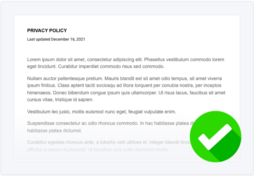Wix is an easy-to-use, codeless website builder that’s very user-friendly.
While Wix doesn’t require privacy policies, several data protection laws do, and if you collect and process personal information, it’s likely at least one applies to you.
In this guide, I explain how to create a privacy policy for your Wix website, what information to include in it, and how to link it to your site.
How To Make a Wix-Ready Privacy Policy
You have a few different options when making a privacy policy for your Wix-hosted website:
- Use a generator
- Try out a free template
- Write it yourself
I’ll walk you through these solutions so you can choose the one that best suits your needs.
Use a Generator
An automated solution, like our Privacy Policy Generator, is hands-down the quickest and simplest way to make a privacy policy for your Wix website.
I recommend this method more than others because it saves business owners time while helping them meet all relevant legal obligations outlined by laws like the GDPR, the CCPA, the VCDPA, PIPEDA, and so many more.
With a generator, you answer straightforward questions about your business and how you handle personal data. Our tool then uses your answers to create a compliant privacy policy for you to put anywhere on your Wix website.
See a sample of one of the questions it asks in the screenshot below.
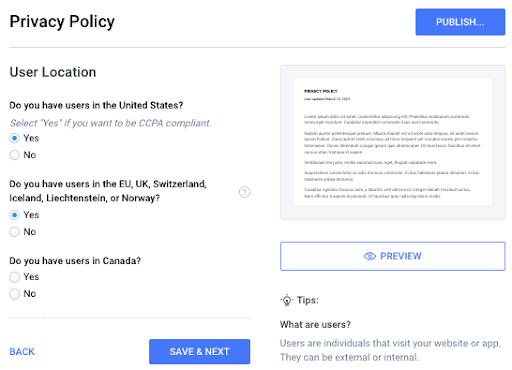
But wait, it gets better!
Our legal team and product engineers update the privacy policy generator whenever old laws change, or new ones occur and alert you via email.
You just need to pop back into your Termly dashboard, make any necessary updates, and rest easy knowing your Wix site is still compliant with applicable data privacy legislation.
Use a Template
You can also consider using our free privacy policy template, which takes more work but is still a fast solution, especially if you only process minimal amounts of data.
You just need to fill in the blank sections of the template with details about your business and modify any existing clauses and language as necessary. You can change as much or as little of it as you want.
Also backed by our legal team, we’ve included clauses to help you meet the obligations outlined by laws, including the GDPR, the CCPA, and more.
See a screenshot example of what our template looks like below.
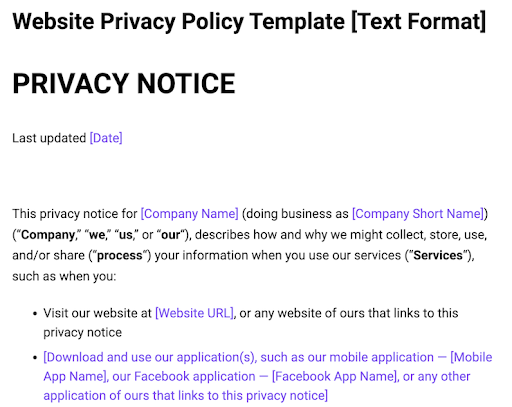
Do It Yourself
Finally, you can always write your own privacy policy for your Wix website from scratch.
However, I only recommend doing this if you have access to a lawyer, extensive knowledge of data privacy laws, or run a website that doesn’t collect personal information.
Writing one yourself takes a lot of time, effort, and legal knowledge. You’ll be held legally accountable if you leave something out, even by mistake.
When Do You Need a Privacy Policy for Your Wix Site?
Even though Wix doesn’t explicitly say you must post a privacy policy to use their platform, you’re most likely required to have one to comply with applicable data privacy laws.
Wix’s privacy policy explains that customers — in this case, you — are responsible for the integrity, security, and authorized use of their users’ personal information, as shown in the screenshot below.

Additionally, in their terms of use, Wix includes an Indemnity Clause explaining that you’ll hold the company harmless if you violate your users’ privacy rights.
See the highlighted text in the screenshot below for more details.
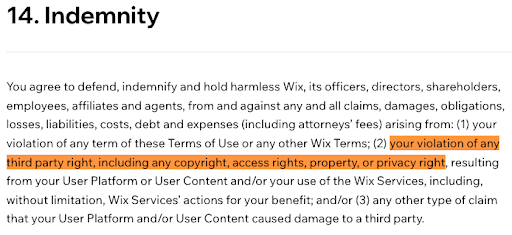
When You’re Required By Law
I’ll talk more about data privacy laws later in this guide.
But for now, know that legislation such as the EU’s General Data Protection Regulation (GDPR) and the California Consumer Privacy Act (CCPA) require websites with users residing in specific regions and states to provide legally compliant privacy policies — this means these laws may apply to you even if you’re located elsewhere.
When You Want to Build Trust
Having a comprehensive privacy policy shows that you care about protecting your users’ privacy rights and builds a culture of trust. Posting one proves that you’re dedicated to transparency and the customer experience, which is important in our current digital climate.
Every website user has the right to know how you use their personal information and what rights they have over the information they give you.
Even if you don’t think your site collects any personal data, section 6 of the Wix privacy policy clearly states that they may collect the personal information of their “users-of-users” — in other words, your website visitors. So it’s best to play it safe and post a policy so you know you’re appropriately protecting your business and your consumers.
What Laws Require a Wix Privacy Policy?
In the table below, learn more about the specific privacy policy requirements for all websites — Wix included — as outlined by various laws and regulations.
| Data Privacy Law | Privacy Policy Obligations |
| General Data Protection Regulation (GDPR) |
|
| The Data Protection Act (UK GDPR) |
|
| California Consumer Privacy Rights Act (CCPA/CPRA) |
|
| California Online Privacy Protection Act (CalOPPA) |
|
| Children’s Online Privacy Protection Act (COPPA) |
|
| Connecticut Data Protection Act (CTDPA) |
|
| Colorado Privacy Act (CPA) |
|
| Virginia Consumer Data Privacy Act (VCDPA) |
|
| Australia’s Privacy Act of 1988 |
|
| New Zealand’s Privacy Act of 2020 |
|
| South Africa’s Protection of Personal Information Act (PoPIA) |
|
| Personal Information Protection and Electronic Documents Act (PIPEDA) |
|
What Must Go In Your Wix Site’s Privacy Policy?
What you need to include in your privacy policy depends on the privacy laws you must follow. These laws are similar in scope but require slightly different things from businesses.
To help simplify this process, I briefly summarized the most common clauses relevant to Wix-specific privacy policies.
What Personal Information You Collect
Every data privacy law requires you to inform your users about what personal information you collect from them; this includes any sensitive personal information.
To keep this clause well-organized, consider using a table or a bullet list that features all categories of data you collect.
Below is a sample of how Wix writes this clause in their own privacy policy:
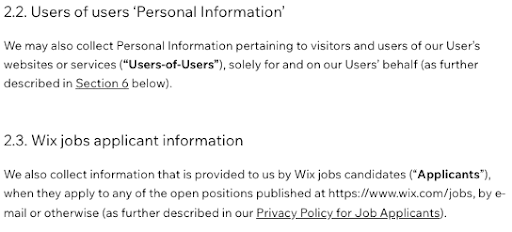
I’ll keep using the Wix privacy policy as an example in this section since the company does a good job practicing what they preach with regard to privacy compliance.
How You Collect the Personal Information
Some data privacy laws mandate you to explain how you collect personal information from your users, including the Privacy Act of 1988, PoPIA, and the EU and UK GDPR.
For example, you may collect data that individuals give to you voluntarily. But you might also get information by placing cookies on their browsers, asking them to fill out online forms, or gathering it from external sources.
Put this information directly in a clearly titled clause in your privacy policy, like how Wix did in the screenshot below:
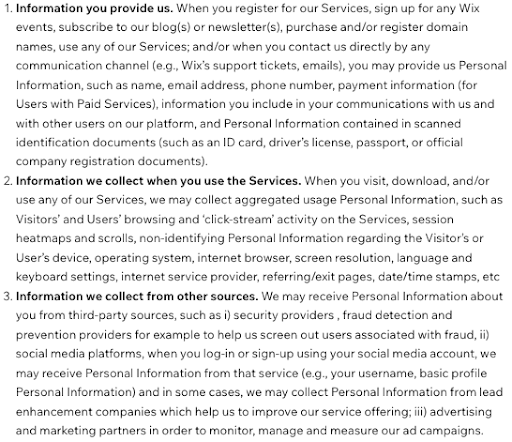
How You Use Personal Information
Under most data protection laws, you must explain how you use the personal information you collect. For example, you may use it for targeted advertising, marketing, and research purposes or to fulfill contractual obligations.
If you fall under laws like the GDPR or the CCPA, you must also state your legal basis for collecting and processing the data.
See how Wix handles this clause in their privacy policy below:
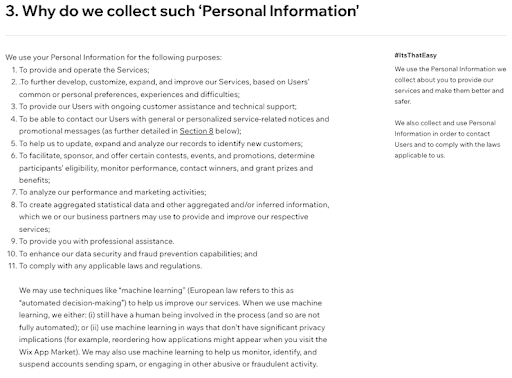
If You Share The Data With Any Third Parties
Most data privacy laws obligate you to tell users if any third parties can access their personal information. In some cases, you must also list the categories of third parties with whom you share data.
Put all of these details in your Wix site’s privacy policy, and consider using a table or bullet list to format these sections so they’re easy for your users to read through.
Below is a sample of how Wix writes this clause in their privacy policy:
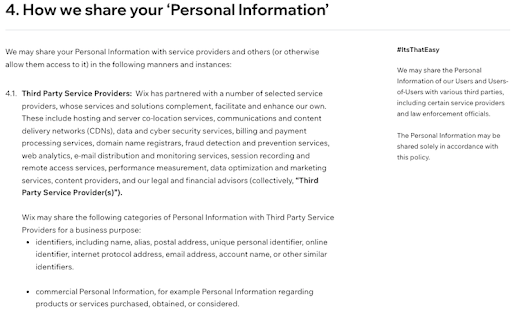
User Rights Over Their Personal Data
Nearly every data privacy law requires you to explain what rights your users have over their personal information. You must also explain how users can follow through on those rights.
If you fall under multiple laws, you’ll need to list the rights of users for each of those regions.
A good way to format this section is to separate it by law or user location so anyone from the EU can read about their rights from the GDPR, and folks in South Africa see their rights outlined by PoPIA, etc.
See how Wix writes this clause in their privacy policy below:
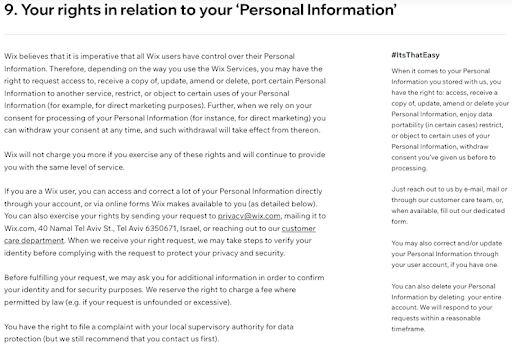
Information About International Data Transfers
Wix websites that may transfer personal data internationally should include a clause explaining what protections are in place to protect that data and ensure the users retain their rights over the information.
Laws like the GDPR, PoPIA, and PIPEDA legally mandate this.
Below, read a sample of how Wix writes this clause in their privacy policy:
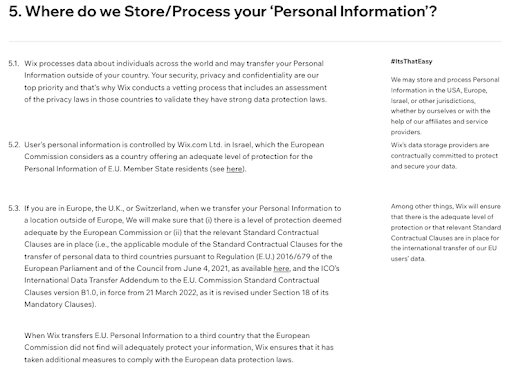
Protecting Children’s Privacy
If your Wix website targets children, you must ensure your privacy policy follows all obligations outlined by COPPA.
If your site doesn’t target minors, you should still include a clause in your privacy policy stating as much and explaining how legal guardians can contact you just in case they ever believe you’ve accidentally collected information from their child.
Privacy Policy Changes and Updates
If your data processing activities change, you must update your privacy policy and inform your users as soon as possible.
Laws like the CCPA require you to update your policy once every 12 months, and CalOPPA requires you to inform users about any changes or updates within your privacy policy.
Below, read an example of how Wix writes this clause in their privacy policy:
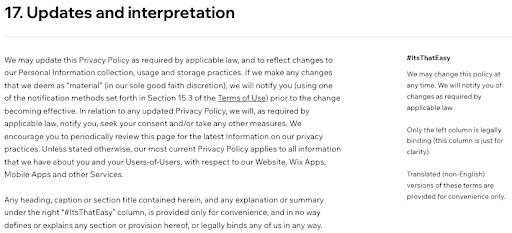
Link to Other Relevant Legal Policies
Whether you run a Wix website or not, it’s a business best practice to link to other relevant legal policies within your privacy policy.
Link to your website’s terms and conditions, cookie policy, and other necessary documents you want your consumers to have access to directly in a clause in your privacy policy.
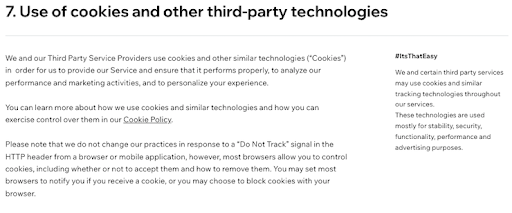
Company Contact Information
You’ll also need to include the proper contact information for your business somewhere in your Wix privacy policy.
Laws like COPPA, PoPIA, and Australia’s Data Privacy Act of 1988 obligate you to include these details directly in your policy. But it also streamlines the process if your users have any questions, comments, or concerns regarding the agreement.
Below, you can see how Wix does it in their own privacy policy.
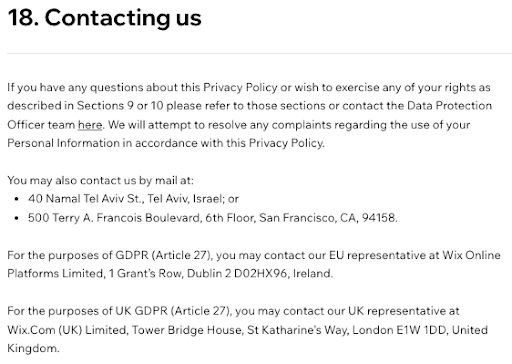
How To Add a Privacy Policy to Your Wix Site
Now that you know what goes into a Wix website privacy policy, let’s discuss how to add it to your website following a few easy steps.
Step 1
First, log into your Wix account and go to the “Editor Page.” Then, click the “Menu & Pages” icon on the left side, shown in the screenshot below.
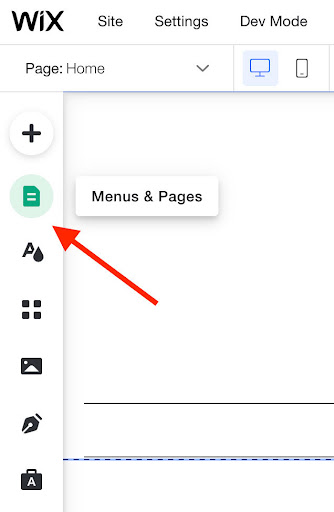
Step 2
Next, to add a new page to your Wix site, click “Add Page,” as pictured below.
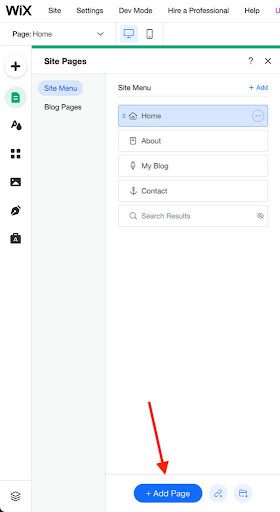
Step 3
Now, you can add a blank page by clicking “+ Blank Page” on the top left-hand corner of the screen or by picking a page template for your privacy policy.
Either way, it’s a business best practice to ensure your privacy policy page has the same look and feel as the rest of your website.
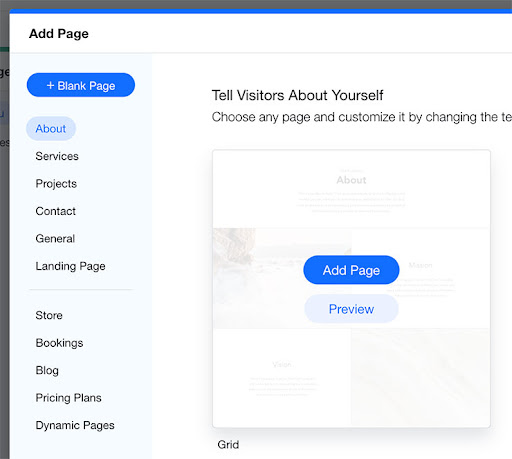
Step 4
After creating your new page, it appears under the site menu. So type “Privacy Policy” into the title field and click “Done.” It should now appear in your site directory.
See a screenshot of this step below.
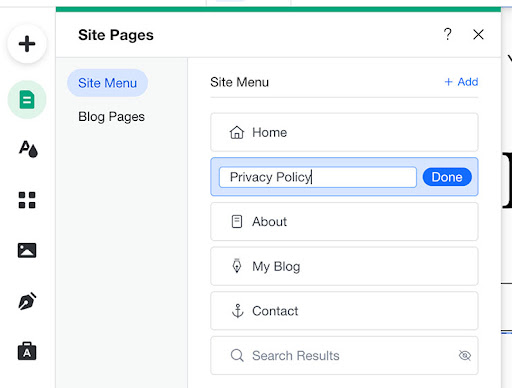
Lastly, click out of the sidebar editor, and you should be inside your new blank “Privacy Policy” page (I recommend you double-check the top left corner to ensure you’re in the right place).
Click the blue “plus” sign in the blank space and use the “Text” insert to paste in your privacy policy, as shown for you in the following screenshot.
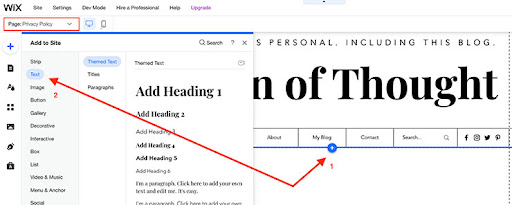
And just like that, you should have a privacy policy on your Wix website. Way to go!
Where To Display a Privacy Policy on Your Wix Site
You must link your Wix website’s privacy policy in specific places to fully comply with certain data privacy laws.
For example, I recommend putting a link to your most updated version of the policy in the following places:
- Website footer: This is a static part of your website that appears on every screen, ensuring your users always have access to the agreement.
- Payment screens: Payment screens commonly collect data, so add a link to your privacy policy so users can read it before placing an order.
- Account creation pages: Account creation or new user pages also typically collect personal data from users, so put a link to your privacy policy here.
- Consent banners: Include a link to your privacy policy directly on consent banners so users can read about your protocols before clicking ‘I agree’.
- Privacy center: It’s a best practice to create a privacy center for your site that hosts all necessary legal policies, including your privacy policy.
- In other legal documents: Link your Wix website’s privacy policy within other relevant legal policies, like your terms and conditions.
Real Examples of Wix Website Privacy Policies
Let’s look at a few strong examples of Wix websites with well-written privacy policies to help inspire you when you go to make your own.
Woodpecker Instruments
The Dutch-based music company Woodpecker Instruments uses Wix to host their website and links to a concise yet comprehensive privacy policy.
This company collects minimal amounts of personal data from users primarily to carry out and fulfill orders, so it’s a good one to use as inspiration if you run a similar simple Wix website.
For example, the highlighted text in the screenshot below explains how Wix hosts their site and what that means regarding data storage.

Further in the policy, they explain their process for making changes to their privacy policy and how they’ll update their users, shown in the screenshot below.

Cuts & Bruises
Next, let’s look at the privacy policy from the Wix-hosted website of Cuts & Bruises, a London-based barbershop.
In the highlighted text below, read their explanation about data subject rights for their European visitors, a requirement under the GDPR.

At the end of the policy, there’s also a section informing users how to contact the company’s data controller, another GDPR obligation. Check it out below.

Their privacy policy is minimalistic and divided into easy-to-read sections that users can quickly scan. But it still includes all relevant information to meet appropriate legal obligations.
Ensure your Wix website’s privacy policy achieves this balance so it’s accessible to as many readers as possible and also thoroughly meets all necessary data privacy requirements.
Summary
Although Wix doesn’t explicitly require users to have a privacy policy, several data protection laws do, and they may impact your business.
Posting a compliant privacy policy also tells users that you care about their privacy rights and are a transparent, honest company.
Thanks to solutions like Termly’s Privacy Policy Generator, making a privacy policy for your Wix website has never been easier.


